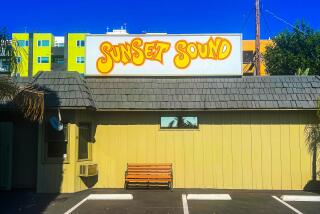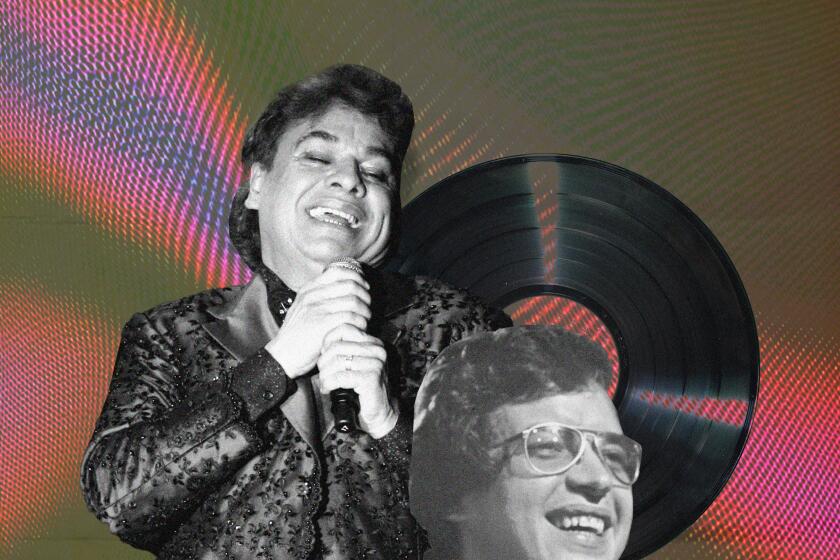California Sounds: New L.A. music from Bryce Vine, Silversun Pickups, Shlohmo and Dwight Trible
Bryce Vine feat. YG, “La La Land” (Warner Bros.).
The L.A.-raised Vine is better at singing and swinging than he is at naming songs, and “La La Land” offers proof.
An ode to his hometown (and not the movie or the Green Velvet house track), the new single works to improve on the success of Vine’s contemporary R&B viral hit “Drew Barrymore.”
The video below contains strong language.

That song succeeded through a whimsical reference in its refrain to the most famous member of a legendary Hollywood family — and a Frank Ocean-esque, soulful sheen.
“Waste your time with me in California,” Vine sings in the “La La Land” refrain. In the video, he does so while on a soundstage in front of a green screen.
A nod to the illusion that is Hollywood, the artist and his lover roam across a projected Los Angeles, walking down Hollywood Boulevard, rolling through residential streets in a classic Corvette, hitting a restaurant, ingesting a piece of magic candy.
Lyrically, he goes clubbing at 1Oak on the Sunset strip and name-drops Coachella. For a rapped verse, Compton rapper YG steps up to further celebrate, California style.
Silversun Pickups, “It Doesn’t Matter Why” (New Machine/WMG).
One of the most prominent Los Angeles rock bands of the last decade steers imaginatively off-course on the first single from its forthcoming album. Called “Widow’s Weeds,” the band’s fifth full-length arrives June 7, and “It Doesn’t Matter Why” suggests some sort of great veer forward.

Like all of “Widow’s Weeds,” the first single was produced by Butch Vig (Garbage, Nirvana, Killdozer). Driven by the famed “motorik” rhythm made famous by 1970s German experimental rock bands and made famous by Queens of the Stone Age, the track runs like a Porsche on cruise control.
Minus the Pickups’ trademark sheets of guitar, the synths drive through midrange frequencies unimpeded. By the end, it seems pretty obvious that, nearly 20 years into its career, the band is humming with renewed energy.
Dwight Trible, “Mothership” (Gearbox).
The Los Angeles jazz vocalist is best known for his mind-melting work on Pharaoh Sanders’ epic of mantra-jazz, “The Creator Has a Master Plan,” but that was decades ago, and since then, Trible has become a kind of patriarch of the Los Angeles spiritual jazz scene — and the only person who can claim to have worked with both rap producer J Dilla and Watts legend Charles Lloyd.

A number of those descendants play on “Mothership,” Trible’s new solo album. A deep, expansive 70-plus minute album, it features contributions by saxophonist Kamasi Washington; violist and arranger Miguel Atwood-Ferguson; percussionist, producer and bandleader Carlos Niño; and pianist Mark de Clive-Lowe.
But, obviously, it’s Trible’s voice that runs “Mothership,” and it resonates with Zeus-like authority on “Brother Where Are You (Mothership).” A song in which Trible lyrically follows a lost soul as he roams through unknown neighborhoods — John Sayles’ film “Brother from Another Planet” comes to mind — in it, his voice maneuvers across octaves with an ease of an artist at one with his muse.
Shlohmo, “The End” (Friends of Friends).
The video for the L.A. producer’s gymnastic electronic track “Rock Music” seems like a metaphor for much of his new album. In it, a stereotypical rock quartet performs for the camera and plays along to the music as if they’re the makers of the song. They’re not, of course — nor does the track require them.

Rather, the insistent, catchy song is the work of Henry Laufer, who records as Shlohmo and is a co-founder of the WeDidIt collective. The producer surged into the Los Angeles beat scene’s consciousness starting in the early ‘10s, and has since produced tracks for artists including Post Malone, Yung Lean, Tory Lanez and Jeremih.
“The End” is his best full-length yet. An attempt to tap the energy of hard rock, metal and punk through use of heavy synths and heavier rhythms, the record works with rock structures without using them as crutches.
“Headache of the Year” opens with tones that could be sampled from Aphex Twin before moving into a distorted-guitar riff that suggests early Black Sabbath. The downtempo song “We Sat in the Car” moves with buzzing, frenetic energy, as if the spare piano chords were ensnared in an electric fence.
For tips, records, snapshots and stories on Los Angeles music culture, follow Randall Roberts on Twitter and Instagram: @liledit. Email: randall.roberts@latimes.com.
More to Read
The biggest entertainment stories
Get our big stories about Hollywood, film, television, music, arts, culture and more right in your inbox as soon as they publish.
You may occasionally receive promotional content from the Los Angeles Times.







